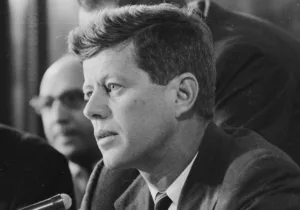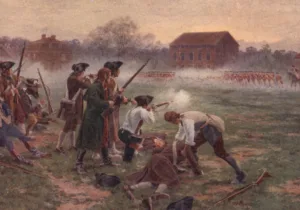The United States is many things in 2024, but it doesn’t seem united. Our map is divided between blue states and red states, blue cities and red counties. Twenty-three percent of Americans want their state to secede, including 31 percent of Texans and 29 percent of Californians. One in three Americans say violence directed against our own government institutions is justified. America, as political analyst Ronald Brownstein observes, is “confronting the greatest strain to its fundamental cohesion since the Civil War.”
What, if anything, do we agree on in this bitterly divided country? Perhaps more than we can see from our cable news enclaves and social media feeds.
Fractures
Before unearthing the common ground that unites us, we need to be realistic about the nature of the fractures dividing us. Seemingly insurmountable differences across various divides have long been part of our history, but in 2024 the divisions are hyper-accentuated by new forms of echo-chamber media; Americans are not using the tools we’ve inherited to build bridges across the divides; and the extremes are punishing and purging the bridge-builders.
President Ronald Reagan sagely observed that “half a loaf is better than none” and that “in the democratic process you’re not always going to get everything you want.” But today the extremes abhor compromise and demand all or nothing. As a result, moderating voices—people who hammer out half-a-loaf compromises—are assailed for trying to find common ground and build bridges across the divides. A case in point was the resistance to Speaker Mike Johnson’s efforts to hold votes on a raft of military assistance bills. As Congressman Dan Crenshaw explained, Johnson was “threatened for even allowing a vote to come to the floor, for allowing the constitutional process to play out as intended by our Founders.”
Our system isn’t designed for such all-or-nothing nihilism. Instead, the Founders crafted a system premised on give-and-take—and checks-and-balances—among coequal branches of government and coequal state and federal governments. By design, no branch of government, neither house of Congress, no president, no agency, no judge, no state, no governor, no political party, no faction within a party, is entrusted with all the power. Compromise, in other words, is baked into our system—an essential ingredient for making America’s government work.
We seem to have forgotten that, as compromise has become a dirty word in American politics. As a result, politics—and political differences—have taken on the characteristics of war. This isn’t hyperbole. Consider the violence and threats of violence on college campuses leveled against Jewish students and faculty by far-left mobs. Consider the events of January 6th, 2021—when a right-wing mob laid siege to Congress; hunted for the vice president and the speaker of the House; attacked police; and engaged in a conspiracy to overthrow the government (their words of admission, not mine of accusation). Consider the violence that marked the Summer of 2020—when, over the course of the Summer, various left-wing mobs assaulted the federal courthouse in Oakland; murdered a federal law-enforcement officer and killed a total of 25 people; seized and occupied a large swath of Seattle; wounded 60 federal agents; and sieged federal buildings in Oregon and Nevada.
Suffice to say, violence and extremism are not confined to one side of the political spectrum—and cast a dark shadow over our politics.
Of course, as Ecclesiastes reminds us, there’s nothing new under the sun. Political violence scarred America in the years just after the founding; in the 1860s during the Civil War; in the early 1900s during a wave of deadly anarchism; and in the late 1960s.
I don’t know if the notion that America has been here before—that today’s political violence parallels yesterday’s—is comforting or troubling. But our history reminds us political violence is not tolerated by the vast majority of the American people—and that we have always found a pathway back to law and order. That brings us to some of the ideas and principles that unite us.
Law and Order
Americans are united in our support for the Constitution, the rule of law, and law and order.
According to AP-NORC polling, 91 percent of us believe equal protection under the law to be “extremely important.” An identical percentage of us believe the right to vote to be “extremely important.” Ninety percent of us believe freedom of speech to be “extremely important.” Eighty-eight percent of us believe the right to privacy to be “extremely important.” Eighty-four percent of us believe religious liberty to be “extremely important.” Eighty-three percent of us believe the right to peacefully assemble “extremely important.” Seventy-seven percent of us believe freedom of the press to be “extremely important.” Seventy-eight percent of us believe the right to bear arms to be “extremely or somewhat important.”
Sixty-nine percent of Americans say that they “trust local police and law enforcement to promote justice and equal treatment for people of all races.” Seventy-two percent of Asian Americans, 73 percent of Hispanic Americans, 81 percent of black Americans, and 88 percent of white Americans want police in their neighborhoods. And 55 percent of Americans “favor strengthening law and order through more police and greater enforcement of the laws.”
If that sounds like a narrow majority, consider this: No president since Reagan in 1984 has garnered even 54 percent of the popular vote. Put another way, “law and order” is not only good policy; it’s good politics.
Immigration
Americans are united on legal immigration. Wall Street Journal polling finds that 58 percent of us support increasing legal immigration, and 74 percent of us support creating a pathway to citizenship for illegal immigrants already here. Underscoring our humanity, 64 percent of us are sympathetic to the plight of illegal immigrants. Only 9 percent of us want to close our borders. Add it all up, and the vast majority of us recognize that immigration is the wellspring of our country and an advantage over our adversaries.
Free Enterprise
Americans are united in our commitment to economic freedom. Eighty-four percent of us support free enterprise. A sizable majority of us support capitalism over socialism (60 percent to 38 percent).
In short, as with supporting law and order, rallying around free enterprise is good politics. Free enterprise is also just and moral as well as good policy: A growing body of research shows that higher levels of free enterprise and economic freedom correlate with better environmental outcomes (see here and here), less corruption, more education opportunities, better health care, higher living standards, and less poverty.
Importantly, America’s free-enterprise system also buttresses America’s foreign policy. The effectiveness of U.S. foreign policy is partly related to our liberal values, partly to our military muscle. But both of these are tied to the U.S. economy. America’s reach and role overseas have always been a function of its economic strength at home. The furnace that fires the arsenal of democracy depends on the dynamism of the free-enterprise system.
National Security
That carries our discussion to the metastasizing threats overseas—China on the rise, Russia on the march, Iran and its Houthi-Hamas-Hezbollah hydra on a rampage.
The good news is that Americans are united on multiple measures of national security, which shouldn’t come as a surprise: Throughout our history, external threats have served as a powerful unifying force. The British army’s massacre of colonists in Boston and the British government’s “intolerable acts” united the not-yet United States. Imperial Germany’s “warfare against mankind” and diplomatic treachery spurred a pacifist America into the Great War. Japan’s “unprovoked and dastardly attack” transformed an isolationist America into a global military juggernaut. The communist bloc’s attempt to seize West Berlin and South Korea rallied Americans for the Cold War. Today, the actions of China, Russia, Iran and their proxies are awakening Americans to Cold War 2.0.
“If there’s one thing that seems to unify Republicans and Democrats,” as Senator John Cornyn notes, “it’s addressing the China threat.” Indeed, even a badly splintered House of Representatives voted overwhelmingly (365-65) to create a special committee focused on the CCP threat.
Polling reveals that 71 percent of Americans support military aid for Israel, 67 percent of us support military aid for Ukraine, and 65 percent of us support military aid for Taiwan. Seventy-seven percent of us support increasing defense spending. In short, the American people are ahead of Congress and the White House when it comes to investing in the necessary tools to deter our enemies, support our friends, and defend our interests. Perhaps Johnson’s ability to bring together what might be called the sensible majority and finally pass the Ukraine-Israel-Taiwan aid package marks a turning point.
Common Ground
Broad-based support for these principles—a commitment to our first freedoms, to law and order, to free enterprise, to legal immigration, to deterrent military strength, to democracies in the crosshairs—serves as evidence that we are more united than the news would have us believe.
A reunited America is not only possible; it’s essential in light of the mushrooming challenges of Cold War 2.0. What an earlier generation of Americans explained at the outset of the first Cold War holds true today: We must summon the “unity…and the tenacity to persevere until our national objectives have been attained.”






